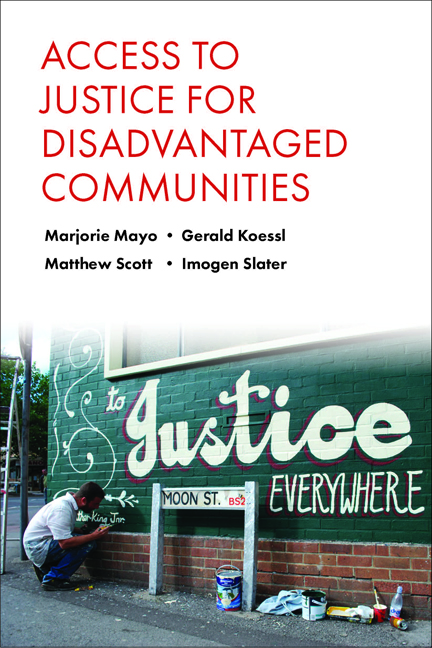Book contents
- Frontmatter
- Dedication
- Contents
- Acknowledgements
- Abbreviations and glossary
- Introduction: accessing social justice in disadvantaged communities
- one Social justice and the welfare state
- two Concepts of justice and access to justice
- three Ethos and values
- four Challenges and dilemmas
- five Public service modernisation, restructuring and recommodification
- six Conflict and competition versus collaboration and planning
- seven Public service modernisation and time
- eight Alienation and demoralisation, or continuing labours of love?
- nine Access to social justice for disadvantaged communities: value and values
- Appendix 1 Research methodology and questionnaire
- Appendix 2 Law Centres included
- Appendix 3 Topic guides for semi-structured interviews
- References
- Index
seven - Public service modernisation and time
Published online by Cambridge University Press: 01 February 2022
- Frontmatter
- Dedication
- Contents
- Acknowledgements
- Abbreviations and glossary
- Introduction: accessing social justice in disadvantaged communities
- one Social justice and the welfare state
- two Concepts of justice and access to justice
- three Ethos and values
- four Challenges and dilemmas
- five Public service modernisation, restructuring and recommodification
- six Conflict and competition versus collaboration and planning
- seven Public service modernisation and time
- eight Alienation and demoralisation, or continuing labours of love?
- nine Access to social justice for disadvantaged communities: value and values
- Appendix 1 Research methodology and questionnaire
- Appendix 2 Law Centres included
- Appendix 3 Topic guides for semi-structured interviews
- References
- Index
Summary
Previous chapters have discussed key aspects of the Carter reforms and subsequent change, as they impacted upon Law Centres, their ethos, values and practices, as well as on the working conditions of Law Centre staff and volunteers. The central issue of this chapter relates to questions of time and, more specifically, to questions of how recent changes have changed both the quantitative and the qualitative nature of working time. So many of the tensions and dilemmas that were being experienced were described in relation to time, in terms of increasing time pressures, in terms of differing notions and understandings of time efficiency and in terms of how time was being valued and measured in the provision of legal advice.
This chapter sets out to show how the accountability system that was put into place with the fixed fee system narrowed the amount of working time to be spent per case, while failing to include funding for time spent on more holistic or preventative work. These transformations of working time may be conceptualised as a re-emergence of Taylorist principles of work, it will be argued, an approach based upon maximising managerial control over the organisation and timing of work processes from the top down, rather than aiming to engage the energies and creativity of the workforce from the bottom up (as in the development of workplace quality circles, for example, approaches that had been widely debated in previous decades). The following section summarises debates on the New Public Management and the sociology of work and time, providing the context for the subsequent discussion of time pressures, along with the discussion of time being wasted – and, conversely, of time being valued – in Law Centres.
New Public Management, neo-Taylorism and the new organisation of (working) time in the public services
As previous chapters have already argued, over recent decades policy makers in Britain have sought to increase the importation of market mechanisms into the administration of publicly funded organisations, including the administration of Law Centres. It was argued that greater competition, an explicit measurement of outputs and performance as well as more generally a stress on a private sector style of management practices would produce a higher degree of efficiency and reduce cost – the changes in governance associated with New Public Management and New Managerialism (Hood, 1991; Power, 1999; Newman, 2000; Newman and Clarke, 2009).
- Type
- Chapter
- Information
- Access to Justice for Disadvantaged Communities , pp. 93 - 102Publisher: Bristol University PressPrint publication year: 2014



